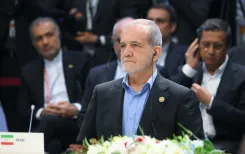What Agreements Have South Korean Prez Lee and China's Xi Reached Regarding Peace on the Korean Peninsula?

Synopsis
Key Takeaways
- Lee and Xi agree on peace efforts
- Importance of dialogue with North Korea
- Economic cooperation evolves
- Seven MOUs signed for enhanced collaboration
- Constructive role of China emphasized
Gyeongju, Nov 2 (NationPress) South Korean President Lee Jae Myung and Chinese President Xi Jinping have come to an agreement to work towards fostering peace on the Korean Peninsula, as stated by National Security Adviser Wi Sung-lac. Seoul is optimistic that Beijing will facilitate the resumption of dialogues with Pyongyang.
During Xi's inaugural visit to South Korea in over a decade, which coincided with the Asia-Pacific Economic Cooperation summit in Gyeongju, Lee urged Xi to assume a constructive role in South Korea's pursuit of peace and co-prosperity in the region, according to Wi's remarks to the press.
At the summit, Lee highlighted the recent uptick in high-level exchanges between North Korea and China, viewing it as a favorable development conducive to renewed discussions with Pyongyang, as reported by Yonhap news agency.
Lee expressed, "I aspire for the Republic of Korea and China to enhance their strategic communications and capitalize on these opportunities to revive talks with North Korea." He emphasized the paramount importance of regional security in his opening statements.
On the economic front, Lee mentioned that the nature of bilateral economic cooperation has evolved from a vertical to a horizontal structure, stressing the necessity for a mutually beneficial relationship.
Xi reiterated China's commitment to its relationship with South Korea, ensuring policy consistency and stability while expressing a desire to strengthen communication with Seoul.
"China is committed to deepening communication with South Korea to jointly tackle challenges, fostering the stable and long-term development of our bilateral strategic relationship, and contributing to regional peace and development," Xi conveyed through a translator.
Describing South Korea and China as "close neighbors and inseparable partners in cooperation," Xi remarked on the mutual benefits derived from sustained exchanges and collaboration.
"Advancing the healthy and stable development of China-South Korea relations aligns with the interests of both peoples and reflects the spirit of our times," he stated.
Post-summit, Lee confirmed that he and Xi had agreed to collaborate for peace, emphasizing their shared objective of enhancing stability and prosperity.
"President Xi and I are committed to progressing together unwaveringly towards peace," Lee declared during a state dinner with Xi. "As our government aims to inaugurate a new era of peaceful coexistence and shared growth, I anticipate China will also embrace a constructive role in this journey."
During the discussions, both nations signed seven memorandums of understanding (MOUs) to expand cooperation in practical domains.
The central banks of the two countries renewed their currency swap agreement valued at 70 trillion won (US$48.9 billion) for another five years.
Additionally, an MOU was established to enhance exchanges and services in trade to facilitate the advancement of their free trade agreement.
Another agreement aimed at fostering collaboration between the law enforcement agencies of both nations to combat voice phishing and online scams.
Wi assessed that the summit represented the "full restoration" of Seoul-Beijing relations, achieved through the Lee administration's pragmatic diplomacy focused on national interests.
During the discussions, Lee presented his government's initiatives for the denuclearization of the Korean Peninsula, seeking Xi's supportive efforts to reignite dialogue with North Korea. Xi affirmed China's ongoing commitment to fostering peace and stability on the peninsula, according to Wi's comments to journalists.
"The two leaders concurred that the US is the most pivotal country for resuming discussions with North Korea," Wi noted.
The dialogue also broached sensitive topics, such as China's recent sanctions against US subsidiaries of Korean shipbuilder Hanwha Ocean, which Beijing alleged had cooperated with a US investigation into China's maritime and shipbuilding sectors.
"There were fruitful discussions regarding Hanwha Ocean, linked to the ongoing trade disputes between the US and China," he noted. "I sensed that easing tensions between Washington and Beijing could facilitate productive progress for Hanwha Ocean in that environment."
Other contentious issues, including China's installation of steel structures in disputed regions of the Yellow Sea and Beijing's restrictions on Korean cultural imports, were also addressed, albeit without elaboration on specifics, according to Wi.
"Both parties acknowledged the need for ongoing communication to resolve these issues," he concluded.









